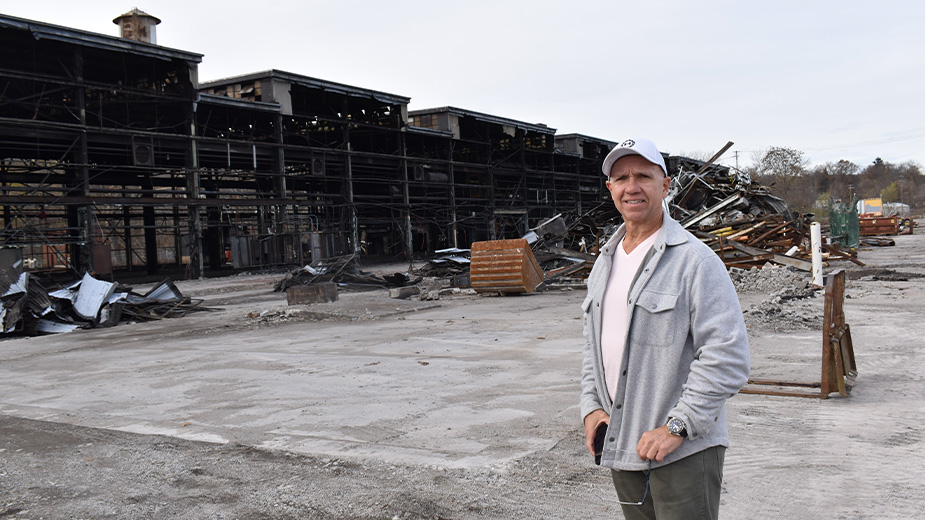With $10M in Backing, Group Vies for Marijuana Site
CANFIELD, Ohio — A company backed by $10 million from three out-of-town private equity investors is vying for an opportunity to produce and process medical marijuana in Youngstown, its principals say.
“Youngstown made the most sense,” said Sanjay Bawan, senior adviser with Mahoning Valley Agricultural LLC. “It’s an opportunity to bring jobs and give back to the community.”
Mahoning Valley Agriculture’s management team met with The Business Journal in the law offices of Betras, Harshman & Kopp Monday, where they outlined their proposal to compete for one of the 24 licenses the state of Ohio approved to grow marijuana for medicinal purposes.
Applications must be submitted by June 30. “We are assuming we could start moving forward in September if we are granted a license,” said Bawan, a businessman from Los Angeles.
The initial $10 million would cover the first phase of the project, Bawan said. This would involve the acquisition and renovation of a building to house an indoor farm somewhere in the city, hiring a workforce and developing and training a production team. A favored site has been identified selected, but the managers declined to specify where.
“We would probably start out with hiring between 60 and 80 individuals just for the management of the growing facility, not counting the building and trade guys to build space out,” Bawan said. “There’s a lot of opportunity in phase one.”
The company plans to apply for a Tier I license, which initially allows for 25,000 square feet of space to grow medical marijuana then expansion up to 75,000 square feet.
Phase two, Bawan said, would increase the footprint to 50,000 square feet. Then, the business would apply for a processing license so it could process the marijuana plants into a state-approved form.
Ohio regulations prohibit the burning of medical marijuana, so the plant must be processed into oils, tincture or an edible form, Bawan noted. But first, the company must obtain a grower’s permit.
“We’re focusing all our attention right now on making sure we have the right team, the right support in the community so we could get the cultivation license,” Bawan said. The rules for processing permits are still under review.
Mahoning Valley Agricultural’s application will stand out, Bawan said, because it’s well financed and presents a long-term commitment to the community. For example, the company has pledged to devote at least 3% of its profits to the city to help with blight removal.
The revenue potential of the venture is unclear, Bawan said, but the business has proved lucrative in other states.
“It’s substantial,” said Eric White, Mahoning Valley Agriculture’s senior managing partner and managing partner at Capital Pacific Group in Los Angeles. “The industry right now is about $4 billion and it’s expected to grow to $20 billion by 2025.”
Should the company be approved for a license, it could begin shipping its product to testing centers by September 2018, Bawan said. Under law, the product can be sold only in Ohio.
Analysts project that the medical marijuana market in Ohio could be as large as 220,000 patients annually and should exceed $500 million in sales. Research from Marijuana Business Daily shows that by the year 2020, the legal marijuana business – including recreational sales — would have an economic impact of $44 billion in the United States alone.
Attorney David Betras, who represents the group, said its managers have met with Youngstown Mayor John McNally and at least one member of Youngstown City Council, leaders of the United Food & Commercial Workers union, and on Monday met with officials from the Western Reserve Building and Construction Trades Council.
“This will be a union facility,” Betras said. “This is a new industry. We will have trained workers. And they’re not asking anything from the city.”
Betras emphasized that jobs created at the farm would pay upward of $20 an hour on average: “These are jobs in which you could support a family.” He said this project alone could create between 250 and 300 jobs paying an average of $50,000 annually should it experience a full build-out to 75,000 square feet.
Mike VanFleet, Mahoning Valley’s grow director who has experience in operating a medical marijuana grow site near Kalamazoo, Mich., said he would supervise training employees at the site.
“We intend to be as FDA [Food and Drug Administration] compliant as we can before it’s required, so that we can provide the highest quality medicine for all patients,” he said.
Ohio is gradually phasing in parts of the program, he said, which enables the industry to evolve at a manageable pace that reduces complications to delivering marijuana to patients who could benefit from the treatment.
Bawan added that the company would recruit students and graduates from area universities that have horticulture and botany programs. Eventually, the processing end of the business would require positions such as organic chemists.
“We recognize there is huge value here,” said Tom Ryan, a Pittsburgh businessman and CEO of Mahoning Valley Agriculture. “It’s a lucrative business and we want to be a catalyst in bringing the community back.”
Still, Ohio has emerged as one of the more highly regulated — and cost-intensive — states to launch a medical marijuana business.
Under new rules the state has adopted, growers seeking Tier I classification must pay a nonrefundable $20,000 license application fee, a certificate of operation fee of $180,000, a $200,000 annual renewal fee, and must set aside $750,000 in an escrow account or a surety bond. Growers in this category must also establish $500,000 in liquid assets.
Tier I growers can cultivate up to 25,000 square feet of marijuana with potential expansion to 50,000 and 75,000 square feet.
Smaller growers, that is, Tier II cultivators, can initially grow up to 3,000 square feet with the potential to expand to 6,000 square feet. They are subject to a nonrefundable application fee of $2,000, a certificate of operation fee of $18,000, a $20,000 annual renewal fee, and must provide $75,000 in escrow or surety bonds, and $50,000 in liquidity.
The state has approved 12 Tier I sites and 12 Tier II sites throughout Ohio.
Once a license is granted, the applicants must build an indoor growing farm with appropriate heating, lighting, and security provisions. The marijuana would then be processed, tested and then sent to distributors throughout the state.
Bawan said Mahoning Valley Agriculture is not interested in owning or operating retail dispensaries.
Final rules governing processors, distributors, testing labs, physicians and caregivers remain under review. These rules must be approved by Sept. 5.
Under H.B. 523, the state has proposed creating up to 40 processors and 60 retail dispensaries. Processors are asked to pay a $20,000 nonrefundable license application fee, $180,000 for a certificate of operation and a $200,000 annual renewal fee.
Dispensary owners will have to pony up a $5,000 nonrefundable application fee, $80,000 for a certificate of operation, and a $70,000 renewal fee due every two years. Plus, there are additional fees tied to renovation and advertising programs.
Under the new medical marijuana law, municipalities and townships have the option of imposing a moratorium on medical marijuana business, or regulate where business is done. Cleveland, for example, has a moratorium until September, while Akron City Council unanimously approved legislation May 1 that encourages companies or investors wanting to distribute or grow medical marijuana.
Locally, Canfield Township, the city of Canfield, and Austintown Township have passed bans on the cultivation or sale of medical marijuana in their communities.
Youngstown Mayor John McNally said he’s met with at least five groups who have expressed interest in establishing grow sites here. “There’s another group interested in a dispensary,” he said, “but that would be further down the road.”
City council is expected to hear presentations Monday from as many as six groups interested in obtaining grow licenses in the city.
McNally said there are four sites thus far identified throughout his city that could accommodate cultivation operations, depending on the size of the group. Those sites were not divulged.
The mayor added he’s hopeful each group will present its plans to City Council before they submit their applications. The groups include both Tier I and Tier II growers, he said.
“From the groups I’ve met with, I’m hearing between 30 to 250 employees,” he said.
McNally said he believes the city would welcome the medical marijuana business.
“I don’t think council would impose a moratorium,” he said. “The use of medical marijuana has been approved by the voters, and I think we have some sites that could be utilized. I’m comfortable with it.”
Pictured: Mahoning Valley Agriculture LLC executive team. From left, Mike VanFleet, Tom Ryan, Eric White and Sanjay Bawan.
Copyright 2024 The Business Journal, Youngstown, Ohio.



